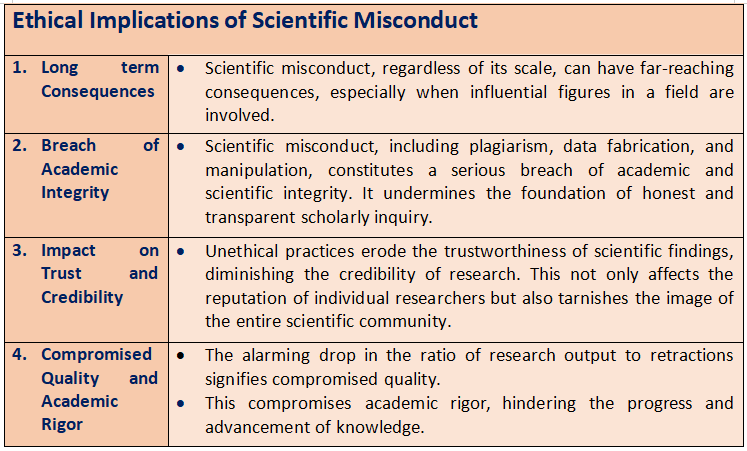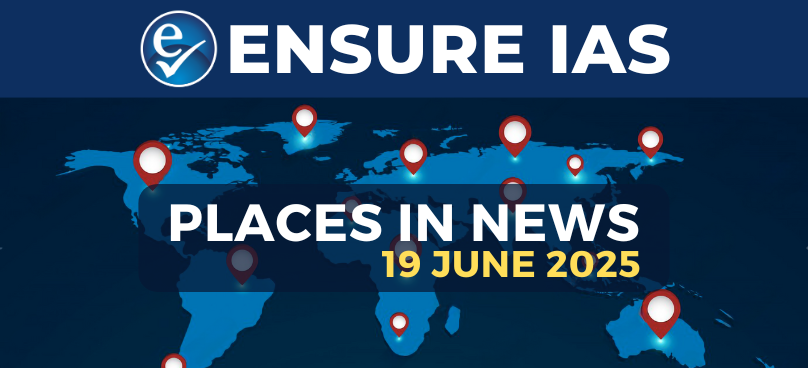- Courses
- GS Full Course 1 Year
- GS Full Course 2 Year
- GS Full Course 3 Year
- GS Full Course Till Selection
- Answer Alpha: Mains 2025 Mentorship
- MEP (Mains Enrichment Programme) Data, Facts
- Essay Target – 150+ Marks
- Online Program
- GS Recorded Course
- Polity
- Geography
- Economy
- Ancient, Medieval and Art & Culture AMAC
- Modern India, Post Independence & World History
- Environment
- Governance
- Science & Technology
- International Relations and Internal Security
- Disaster Management
- Ethics
- NCERT Current Affairs
- Indian Society and Social Issue
- NCERT- Science and Technology
- NCERT - Geography
- NCERT - Ancient History
- NCERT- World History
- NCERT Modern History
- CSAT
- 5 LAYERED ARJUNA Mentorship
- Public Administration Optional
- ABOUT US
- OUR TOPPERS
- TEST SERIES
- FREE STUDY MATERIAL
- VIDEOS
- CONTACT US
Rising Scientific Misconduct in India
Rising Scientific Misconduct in India
11-11-2023

Context
According to a survey by India Research Watchdog the escalating number of retractions in Indian research, raising substantial concerns related to Scientific Misconduct in India.
About Scientific Misconduct
- Scientific misconduct can be described as a deviation from the accepted standards of scientific research, study and publication ethics.
- There can be many forms of scientific misconduct such as Plagiarism, Misconduct involving experimental techniques, and Fraud.
- Retractions occur when published papers are withdrawn from the scientific literature due to various reasons, including mistakes, data fabrication, plagiarism, and other forms of misconduct.
Statistics of Scientific Misconduct in India
-
Increases Scientific Retractions:
- Retractions from India have increased 2.5-times between 2020 and 2022 over the number recorded between 2017 and 2019.
- The primary reason for retractions is identified as misconduct, where authors knowingly engage in unethical practices.
-
Quality Decline Indicators:
- The ratio of research output to retractions is used as a proxy for quality, revealing an alarming drop in India, almost halving the ratio. This indicates a potential decline in the overall quality of research.
-
Domains of Retractions:
- Engineering sees a significant increase, accounting for almost 48% of all retractions, up from 36% in the period 2017-2019.
- Additionally, the humanities experience an extraordinary growth of 567% in retractions.
-
Reasons for Rise in Scientific Misconduct:
- A little more than half of the respondents believe that university ranking parameters are behind the rise.
- Another 35% attributed it to unethical researchers, while 10% pointed to the minimal action taken when an allegation is reported or when an offender is ‘caught’.
- Additional factors contributing to the rise in retractions include the compulsory publication requirement for PhD students instituted in 2017, potentially leading to low-quality publications, and the proliferation of predatory journals.

-
Urgent Call to Action:
- The data is presented as an urgent call to action, emphasizing the need to scrutinize research malpractice in Indian academia.
- The potential consequences on both research and teaching are highlighted, urging immediate intervention to prevent the production of substandard or bogus research.

Way Forward
- In response to the absence of institutional efforts, some scientists have taken it upon themselves to scrutinize collaborative work, distinguishing between credible and flawed research to avoid tarnishing all their work.
- However, a broader revaluation is necessary, particularly among influential figures in science. The idealized notion that science is inherently rigorous and self-correcting needs to be revised, recognizing its complexity and the need for enhanced methods and norms.
- This requires incorporating technology and incentives to promote continuous self-assessment and improvement, making it a standard practice rather than a response to 'special' circumstances.



